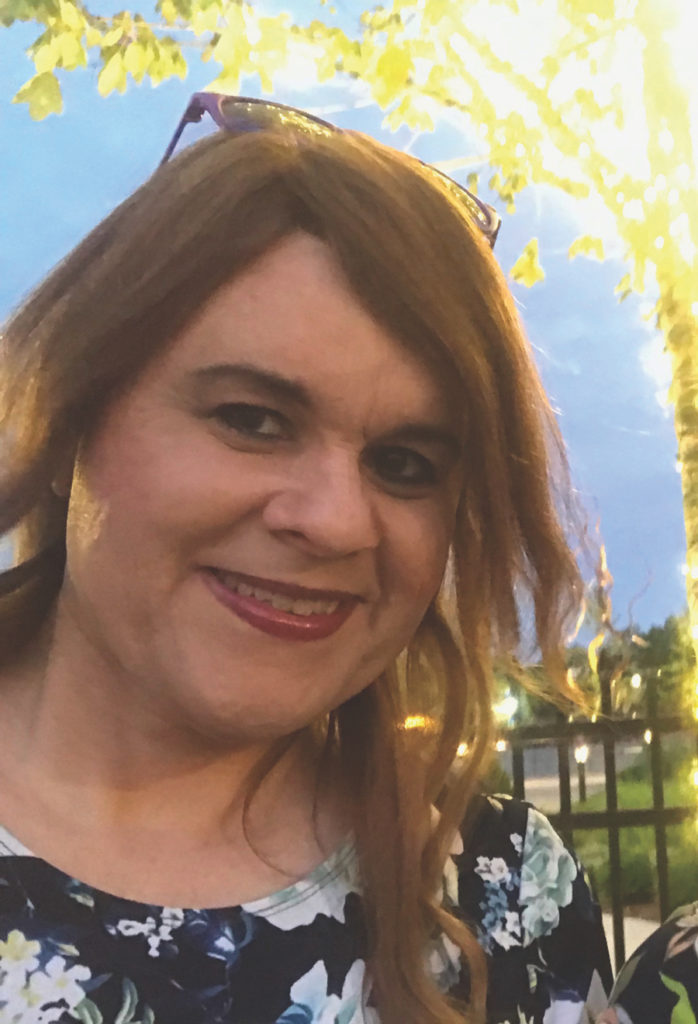Fantasia Fair, which unfolds from Sunday, Oct. 20, to Sunday, Oct. 27, represents the best of Provincetown. This isolated village at the end of Cape Cod is a haven for the transgender community — it’s friendly, it’s tolerant, it’s uninhibited, it’s experimental.
By 1975, the year of the first Fantasia Fair — before Women’s Week, Family Week, and Bear Week were even germs of ideas — Provincetown was becoming well known as a destination for gay men and lesbians. Fantasia Fair was created and frequented largely by men who were not gay but were known as cross-dressers: in their everyday lives, they presented as men, but at some point, they felt compelled to dress as women.
Recall the scene in “Ed Wood” (1994) when Wood, played by Johnny Depp, tries to explain himself to low-budget film producer Georgie Weiss (Mike Starr):
Wood: “I like to dress in women’s clothing.”
Weiss: “You’re a fruit?”
Wood: “No, not at all. I love women. Wearing their clothes makes me feel closer to them.”
Weiss: “You’re not a fruit?”
Wood: “No, I’m all man. I even fought in W.W. II. Of course, I was wearing women’s undergarments under my uniform.”
Just like the gay rights movement, which is now LGBT and proudly, broadly queer, Fantasia Fair has come a long way since 1975. Likewise, public understanding of transgender people has come a long way since “Ed Wood.”

“It’s evolved with the times,” says Dee LaValle, director of Fantasia Fair. “The needs of the community 45 years ago are different than the needs of today. It was a different dynamic back then.”
The nonprofit parent of Fantasia Fair is the Transgender Education Association, and women and men who identify as trans are now an essential part of the Fantasia Fair experience. Transgender, as a term, refers to a spectrum of gender identities (male-to-female; female-to-male) and gender fluidity. Identity is key, not surgery or biology, and thus transgender has largely supplanted the term “transsexual.” Classic cross-dressers, even if they identify as cisgender in public, have an aspect of private gender fluidity that is an essential part of them. Seen this way, transgender identity is existential: you are assigned a gender at birth, based on biology, but what you actually “are” is what you define yourself to be, based on your own inner truth.
In 1975, LaValle says, “Fantasia Fair was more of a solitary organization. Now partners are more important and are more part of the situation.” LaValle’s “significant one,” or S.O., Jolie LaValle, is a cisgender woman, and leads workshops and other activities for other S.O.s at the fair.
“With society being more accepting,” Dee LaValle says, “there are more people coming out later in life. They can come down to Provincetown, to the fair, and decide for themselves who they are. You might have somebody come to the fair and present male for the entire week, and then present female only once, at the end.”
There are conferences for trans people all over the world, but Fantasia Fair is different. “This experience is unique,” LaValle says. “It’s a full-immersion event. It’s not a little dance here or dinner there. It’s 24-7 for a week. It’s a freeing experience. That’s what makes the town so wonderful. You can walk around and befriend people who live and work here. At conferences, it’s all controlled. Believe me, I like being around all trans people. But actually, having a relationship with the folks in town is pretty amazing.”
There are all sorts of workshops, keynote speakers, and events at the fair, some of them educational, some therapeutic, some practical, and some entertaining. And while the fair is not an activist organization, “a significant number of political hopefuls cut their teeth here,” LaValle says. Many trans elected officials participate — state Rep. Gerri Cannon from New Hampshire, for example, will teach a workshop this year. “The Yes on 3 campaign was really huge last year,” LaValle says, referring to the ballot question on transgender rights that was ultimately approved by Massachusetts voters. “You know what the number one community that voted yes was? Provincetown. Ninety-two percent.”
Provincetown has always been a magnet for drag queens, both amateur and professional, but how do they fit in the transgender spectrum? The drag world, LaValle says, “is a little bit separate as a community.” Drag queens assume the female gender as a theatrical persona, or simply to entertain. Though they use female names and pronouns for their drag personas, they often identify as cisgender men in their private lives. “Typically, a drag queen is more connected to the gay community,” LaValle adds. “This is just my opinion.”
Stonewall will be commemorated at the fair, and some of the people at the front lines of the riots, such as Sylvia Rivera and Marsha P. Johnson, were known as drag queens in the earlier years of the movement, though they ultimately identified as trans women. Indeed, everyone in the post-Stonewall era besides white gay men — lesbians, bisexuals, transgender people, people of color — was given short shrift. AIDS helped to change all that, but so did the tireless activism of disenfranchised groups under the LGBT umbrella.
The Follies, a fair event on Friday night at the Crown & Anchor, is open to the public. Participants perform as entertainers, some of them for the first time as trans women or trans men. “It’s a really powerful experience for a lot of people,” LaValle says.
It’s also a way to give back. “We’re a generous community,” LaValle says. “All of the proceeds from the Follies, all the tips, go to a local cause or charity. Once we gave it to the Provincetown Police Dept. One year it was for equipment for the fire department. Last year, we sponsored events at the UU. This year it’s the LGBT Welcome Center. It’s our way of giving back to the people of Provincetown.”
See the full schedule online at fanfair.info.



